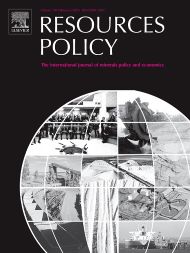The cost of mining benefits: localising the resource curse hypothesis
Local resource curse problems epitomize the difficult interface dynamics confronting resource developers and host communities. These problems centre on the opportunity costs that local people encounter due to their proximity to resource development projects. Our fundamental objection is the working assumption – and in some cases the proposition – that people are getting something for nothing. In this paper we challenge two persistent ideas in the resource economics literature. First, that resource curse problems occur primarily, if not exclusively, at the national level, and second, that mining benefits are cost neutral to communities. We argue that pro-industry constructs such as ‘shared value’ and ‘shared benefit’ are detrimental to the study of local resource economies, and in particular, the examination of cost-benefit scenarios in resource enclaves. Our aim in this paper is to draw attention to local resource curse problems. These are effects that involve significant opportunity costs for local communities as a result of their direct participation or near proximity to large-scale resource projects.
Language: English
Publisher: Resources Policy
Region: Australia
Type: Article
CITATION
Owen, J., Kemp, D., & Marais, L. (2021). The cost of mining benefits: localising the resource curse hypothesis. Resources Policy, 74, 102289. https://doi.org/10.1016/j.resourpol.2021.102289.

